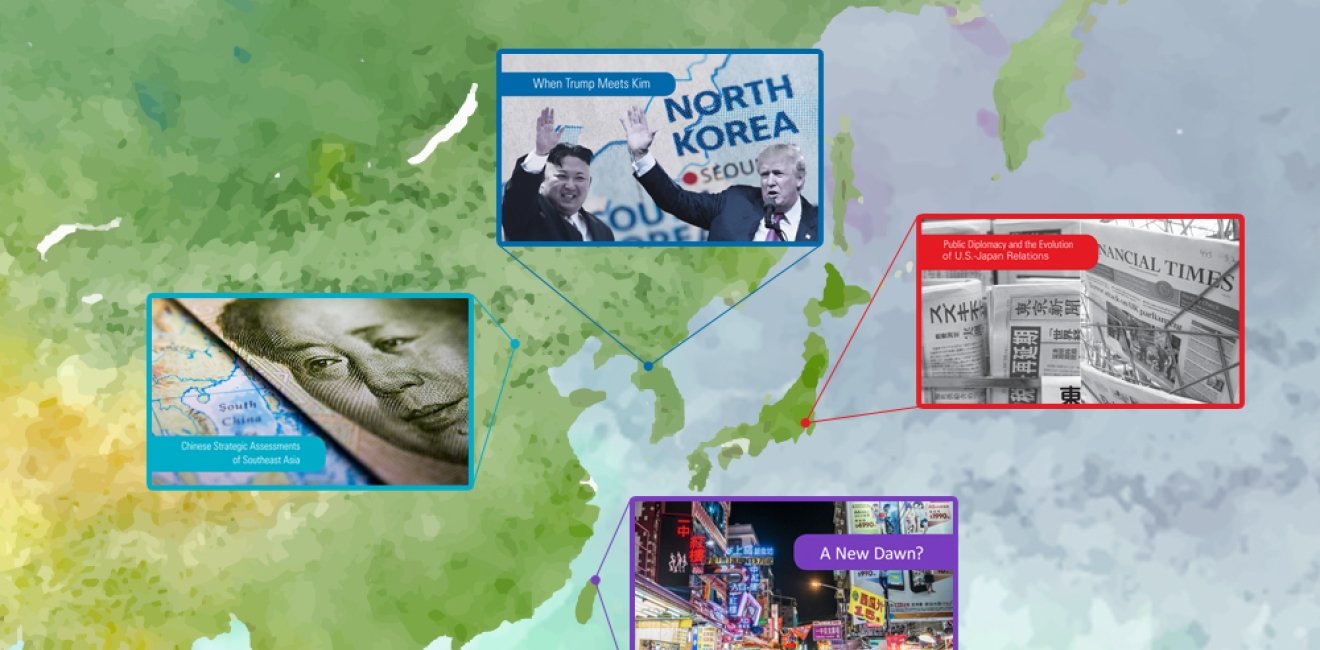
A blog of the Indo-Pacific Program
At the Asia Program, our experts and scholars are always producing new research and analysis on a rapidly changing region. Our most recent pieces look at North Korea, Japan, China, and Taiwan to explore foreign policy, diplomacy, military strategy, and trade. All of our reports are available for download on our website. You can also sign up for our mailing lists to be updated about upcoming events, recent publications, and other news.
When Trump Meets Kim by Abraham Denmark and Nirav Patel
The long-simmering crisis between North Korea and the United States has reached a new, consequential phase. President Trump’s decision to meet with North Korean leader Kim Jong-un will be a decisive moment in a struggle that has lasted since the United States first suspected North Korea of harboring nuclear ambitions in the 1980s. Regardless of how the summit may transpire, one thing is clear: this challenge, and the geopolitics of East Asia, will never be the same again.
The stakes of this summit could not be higher. Presumably, if diplomacy does not work the same conditions that inspired President Trump’s “fire and fury” bromides hold true. How the Trump administration approaches this summit will be critical to its success or failure. This analysis by Abraham Denmark and Nirav Patel will review the issues and challenges that the summit will entail and recommend a pragmatic way to approach this summit and what may come next.
Public Diplomacy and the Evolution of U.S.-Japan Relations by Yasuhsi Watanabe
Among experts, the concept of “public diplomacy” is getting more ambiguous and problematic. It has been long time since such a new concept as “New Public Diplomacy” has come into vogue, with the multiplication of non-state actors and the emergence of new digital technologies. However, at the time when diplomacy has become more multidimensional and public engagement has become the “whole of government diplomacy”, what are the quintessential properties of “public diplomacy” per se? If “diplomacy” is an art of shaping realities and setting agendas, or negotiating over norms and institutions (or boundaries and categories at large), how is it different from “public diplomacy?” Japan Scholar Yasushi Watanabe explores these questions in his newest piece, "Public Diplomacy and the Evolution of U.S.-Japan Relations."
Chinese Strategic Assessments of Southeast Asia by Marvin Ott and Yilun Hao
Southeast Asia has been, and remains, a natural focus of China’s geopolitical ambitions. Beijing’s strategic approach toward the region has crystalized as Chinese capabilities have changed. Today’s China is unmistakably asserting its status as Asia’s dominant power and Southeast Asian states find themselves under growing pressure to accommodate and defer to a new and increasingly stark reality. The geopolitical future of Asia is in play, the pace of change is breathtaking, and the stakes both for the region and for the United States are enormous. To understand the game it is vital to better understand how China’s strategic approach to Southeast Asia has evolved.
This report by Marvin Ott and Yilun Hao provides selective translations of two articles from Chinese experts on their maritime strategy and expert analysis on the information in these primary source materials.
A New Dawn? The New Realities of U.S.-Taiwan Economic and Trade Relations by Jinji Chen
U.S. trade protectionist policies will have a major impact on how Taiwanese companies do business. The existing Taiwan model of receiving orders, then manufacturing goods in China, which are then exported to the United States will face considerable challenges moving forward. Yet the exports of Taiwan’s intermediate goods have a positive impact on U.S. manufacturers’ final export of consumer goods. The Wilson Center’s former Taiwan Scholar Jinji Chen argues that Washington and Taipei can actually do more to enhance trade relations by pursuing a Trade and Investment Framework Agreement.
Are you looking for a deeper read? Check out these recent books:
The Leverage Paradox by Robert M. Hathaway
Understanding the North Korean Regime by Atsuhito Isozaki
The views expressed are the author's alone, and do not represent the views of the U.S. Government or the Wilson Center. Copyright 2018, Asia Program. All rights reserved.
Author


Indo-Pacific Program
The Indo-Pacific Program promotes policy debate and intellectual discussions on US interests in the Asia-Pacific as well as political, economic, security, and social issues relating to the world’s most populous and economically dynamic region. Read more


Hyundai Motor-Korea Foundation Center for Korean History and Public Policy
The Center for Korean History and Public Policy was established in 2015 with the generous support of the Hyundai Motor Company and the Korea Foundation to provide a coherent, long-term platform for improving historical understanding of Korea and informing the public policy debate on the Korean peninsula in the United States and beyond. Read more


Kissinger Institute on China and the United States
The Kissinger Institute works to ensure that China policy serves American long-term interests and is founded in understanding of historical and cultural factors in bilateral relations and in accurate assessment of the aspirations of China’s government and people. Read more





